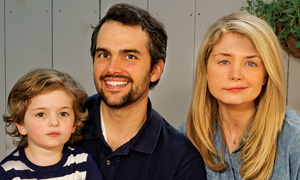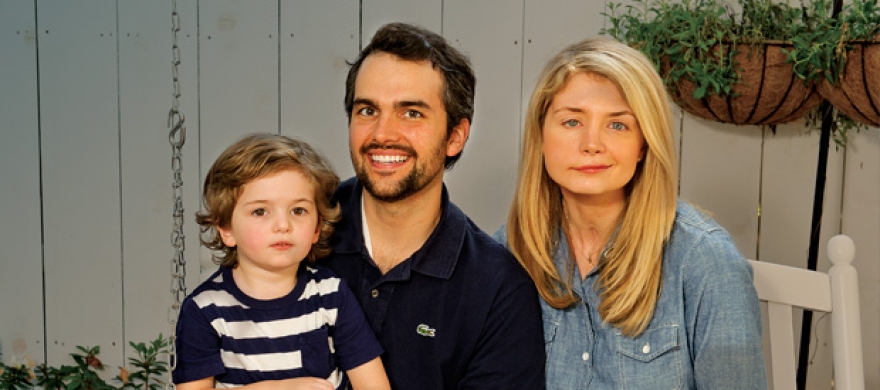"On April 21, 2008, I had a massive brain-stem stroke. I was not expected to live or recover,” begins Katherine Wolf.
At that time, she and her husband Jay Wolf (JD ’08) were living on campus at Pepperdine, where they were young parents to 6-month-old baby James. Jay was a third-year law student, and Katherine was a model and actress with full representation and a promising career.
Just three weeks before Jay was set to graduate, Katherine suffered a rupture in her brain of a tangled mass of abnormally formed blood vessels known as an arteriovenous malformation (AVM). The resulting 16-hour surgery started a new chapter in their lives, one focused on her survival.
Jay and Katherine met in college. She was a theatre student from Georgia, and he a high-achiever from Washington, D.C., and Alabama. They fell in love, married, and moved across the country to Los Angeles to chase their dreams. While he studied, she worked as a model in print campaigns for Disney, Harry Winston Jewelry, and Target.
In the days leading up to her injury, Katherine had a headache and felt a little off. That fateful morning, she ran errands around town in Malibu, mailed a stack of letters, and returned home to put James down for a nap. At noon, Jay came home to their on-campus apartment to gather a few things for a class presentation. “Quite honestly, if I had been prepared for class, I wouldn’t have come home,” remembers Jay.
Katherine called to him in the next room as she staggered to her knees, arms and legs numb. Jay ran in, trying to help, but she was already vomiting and couldn’t hear a word he said. Katherine’s AVM had ruptured, and the pressure began pushing her brain down into her spinal cord.
The ambulance came, and Katherine was taken out on a stretcher. She lost consciousness in the ambulance and has no memory of the subsequent month-and-a-half of her life. Against odds, there was a neurosurgeon on call at UCLA who was willing to operate. He took the case despite the stats: the hospital would likely lose $300,000 to $400,000 and Katherine might not survive. The surgeon told Jay to trust him and confided that he felt in his gut that he had to take the case.
What the surgeon found in the 16-hour surgery was the largest AVM he had ever seen. In the process of removing it, they had to take out intercranial nerves that controlled hearing in her right ear and facial control of her eye, eyelid, cheek, mouth, tongue, and palate. The right side of her face would be paralyzed.
 Jay and Katherine Wolf
Jay and Katherine Wolf
Since blood cannot touch any part of the brain without causing tissue death, the surgeon was forced to remove 60 percent of her cerebellum, the part of the brain that controls balance and coordination and gives one the ability to perceive the difference between up and down.
“They had to scrape her brainstem, and at that point the doctors didn’t know if she would ever be able to breathe on her own again,” remembers Jay. A massive undertaking, the surgery required the work of eight anesthesiologists. Katherine’s entire blood volume was replaced five times; the blood transfusions alone cost over $50,000.
The day after her surgery, Katherine was able to wiggle her fingers and toes on command, an unheard of success for someone in her condition. But the small miracle was only the beginning of a long, arduous recovery.
Those next days in the ICU were tough on Jay. “It seemed like nearly every day Katherine would have a procedure done that was life threatening. They would say, ‘we need your permission to tap the shunt in her brain.’ I remember thinking, someone as young as I was, with a baby, why should I have to make these decisions?”
Jay had no choice but to do everything he could for Katherine. “UCLA is a phenomenal hospital, but they are all just humans—nurses, care partners, doctors, people who want to be helpful of course, but no one had more invested in this patient than me,” he says. “I took it upon myself to be her advocate and to completely understand everything that was going on. That was what I felt my role was.”
“Jay was amazing. I could literally not speak for myself,” remembers Katherine of those early days in the hospital. “And I was in no mental state to understand the medical jargon.” Jay adds, “My legal background gave me the confidence to deal with dense material and the confidence to interact with the doctors.”
Katherine spent 40 days in the ICU, and the Biblical image of the desert was at the forefront of Jay’s mind. “We were wandering, hoping to make it to the other side with the Lord’s help, and we did,” he says. “I felt at peace too, that she was going to pull through. I felt like this is my other half. I have to do everything I can.”
Their lives before the injury were a distant memory. “When a family member is sick in your life, everything else just disappears,” Jay explains. “Everything is about their recovery. I really hardly knew what a stroke was at that time. The best man from my wedding was getting married that August, and this was April, so I ordered my suit because I thought, we’ll be there. I just had no idea.”
From day one of the injury, there was an outpouring of support for the Wolfs from family and friends, particularly the communities at Pepperdine and Bel Air Presbyterian Church. The night of Katherine’s surgery, more than 100 people came to pray in the waiting room. For the next three weeks they had visits around the clock from Jay's classmates, professors, and more. As each day passed, friends and family posted updates to blogs and Facebook groups, spreading the word about the Wolfs’ story. Within days, people in more than 130 countries were praying for Katherine.
“Even if you are not some super ‘spiritual’ person, it would be hard to look at my situation and think ‘there isn’t some greater power at work here,’” says Katherine of the many miracles that led to her survival.
Little by little, Katherine regained strength as she learned to speak, eat, and walk again. After four months in the hospital, Jay, Katherine, and James moved to a rehabilitation center in Pomona, California, where she continued therapy for more than a year. She spent up to six hours a day working with an occupational therapist, physical therapist, neuropsychologist, and speech language pathologist to relearn the motor skills that used to be effortless.
Eating proved particularly difficult because the nerve that helped with swallowing had been cut. She failed countless swallowing tests, and had to get her nutrition through a feeding tube for 11 months. “Getting food through a tube was so isolating,” says Jay, who fed Katherine every day through the tube. “We love to eat. It was a strangely traumatic scenario.” Katherine adds, “At one point I said, I’d rather eat than walk again.”
Looking back, Jay and Katherine feel that their lives were orchestrated in a way to bring them through this tragedy. “All of my life I excelled in theatre. I ended up getting a theatre scholarship to college. It’s all because God wanted me to move to Los Angeles to save my life,” says Katherine.
In the days after the surgery, Katherine's doctor presented the case to a panel of UCLA neurosurgeons and each one said they would not have taken it. The Wolfs learned of another young woman in Palm Beach, Florida, who had an AVM rupture and was rushed to the hospital. The hospital didn’t have the resources to operate on her, and she died.
The Wolfs point to another miracle in how they invested in the community where they lived, giving them people to lean on throughout the hardest times. “We were encouraged by others to really make a life here in L.A. instead of waiting by the phone for the agent to call or spending night and day in the library studying,” says Jay. “We invested in people. We focused on things bigger than the next three years of law school and a modeling career.”
Today Katherine continues her recovery even as she speaks to people about her story. “God gave me a gift because I never understood what true perseverance was,” she shares. “Katherine was pursuing acting and modeling, but really her greatest gift was public speaking,” says Jay. “We have this gift of encouragement that we can give people. Through unfortunate circumstances we now have this platform.”
Three years since her injury the Wolfs have high hopes that Katherine will continue to recover. Jay recently transitioned to a new job in business development at the environmental remediation company GEO, Inc., allowing him to work from home as he cares for Katherine and James. “The dream is to continue to find the good in our situation,” reflects Jay. “The harsh reality is that Katherine may never drive again. She might not ever walk without a cane or have a normal-looking life. We have to continue to trust that what God has for us is all that we need.”
Katherine is ever optimistic, and her message is one of hope. “You can do so much more than you think you can. Your attitude is so important. My attitude is fueled by my faith. Having the perspective that this isn’t all there is gives me hope for the future.”
